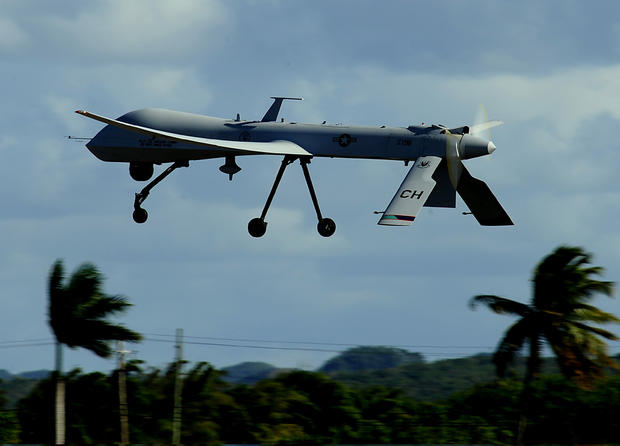Group warns drone users violating laws of war
As the Obama administration ramped up its use of unmanned aerial vehicles, or drones, in the fight against Islamic militants on foreign soil, questions of legality and the rules of modern warfare became inevitable. The Pentagon now has 7,000 drones -- up from less than 50 in 2001 -- and the long-term consequences and benefits are yet to be determined.
Several rounds of questions have been raised by U.N. Special Envoys, particularly the Special Envoy for Extrajudicial Killings, about whether noncombatants (a CIA employee, for example) are covered by the laws of war (the Geneva Conventions).
A report released Thursday by the Oxford Research Group, an independent London think-tank, concludes that all parties involved in drone attacks are legally obligated to search for and identify all persons killed in such strikes.
Other requirements, according to the scholars' examination of current international law, include establishing official graves and a registration service for the dead.
"It is high time to implement a global casualty recording mechanism which includes civilians so that finally every casualty of every conflict is identified," wrote Susan Breau, the report's lead author and a professor of international law at Flinders University in Australia. "The law requires it, and drones provide no exemption from that requirement."
"Drone users cannot escape a legal responsibility to expose the human consequences of their attacks," adds Paul Rogers, an Oxford Research Group consultant and professor at Bradford University's Peace Studies Department in England.
Drones warfare: Science meets science fiction
The study is a comprehensive review of current treaty-based and customary international laws of war.
But it may not have much impact on the Pentagon or Obama administration's policy.
Several U.S. Supreme Court cases on Guantanamo detainees have rejected the impact of the international treaties cited by the Oxford Research Group's report on U.S. law, as they are not self-executing and do not carry the same weight as federal law.
And the U.S. Defense Department might view the concept of collecting and identifying bodies and establishing a registry for the dead as defeating the point of a war conducted largely without troops on the ground - as has been the case in Pakistan.
But that's not the point of the study.
The report attempts to deal with the impact of an unmanned and sometimes unidentified killing -- a new grey area of ethics in the conflicting laws of war.
Drone warfare is, doubtless, a relatively new phenomenon, and some analysts think it should be considered exceptional.
"It is the considered view of this administration - and it has certainly been my experience during my time as legal adviser - that U.S. targeting practices, including lethal operations conducted with the use of unmanned aerial vehicles, comply with all applicable law, including the laws of war," White House legal adviser Harold Hongju Koh said in a speech to the American Society of International law in Washington last March.
Nonetheless, Breau notes in the new study that drones "are fast becoming the weapons of choice by the United States and its allies in South Asia and the Middle East, yet their use raises major questions about legality which have been very largely ignored. A key and salutary finding of this report is that drone users cannot escape a legal responsibility to expose the human consequences of their attacks."
With the technology developing to create unmanned drones the size of insects, this debate is surely just beginning.

